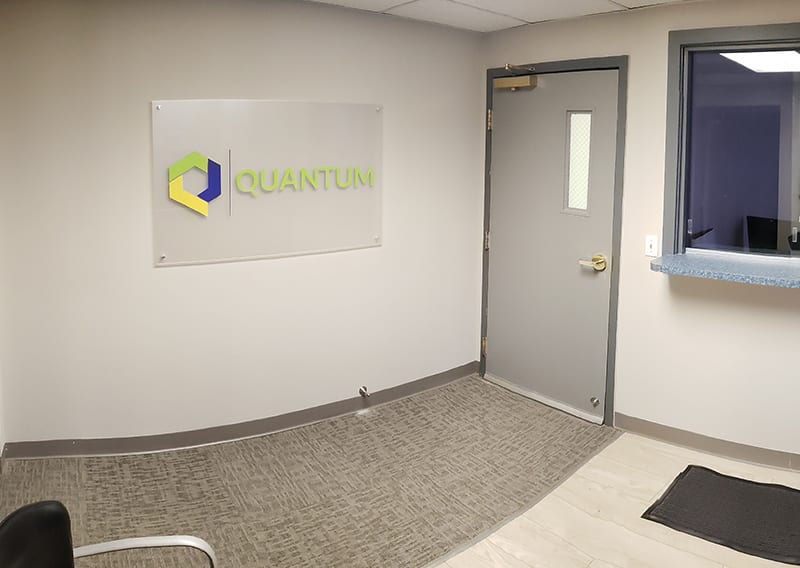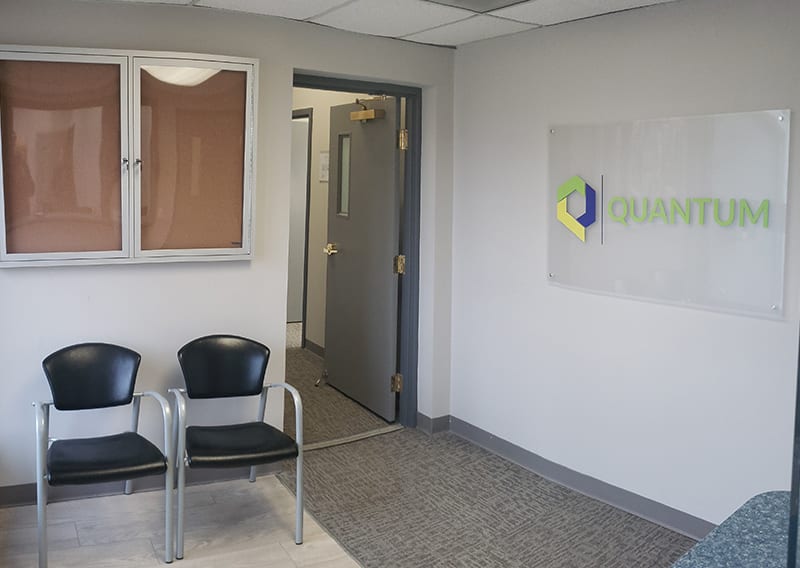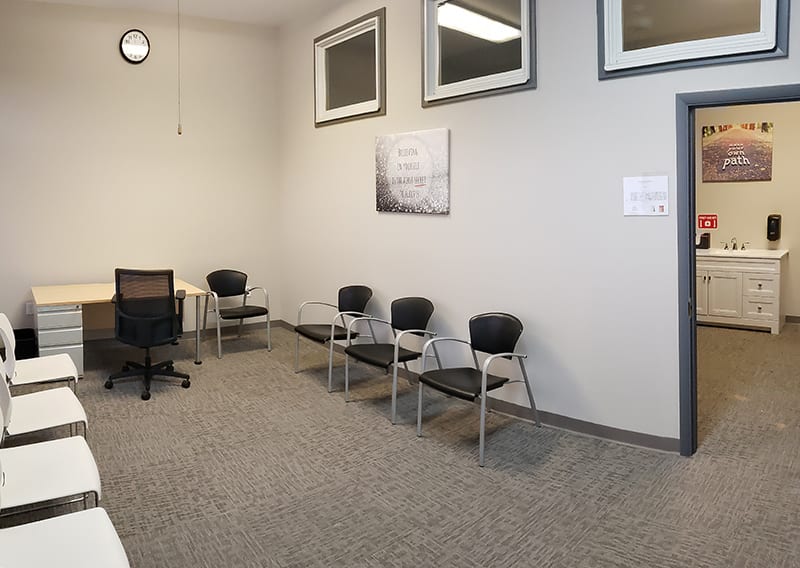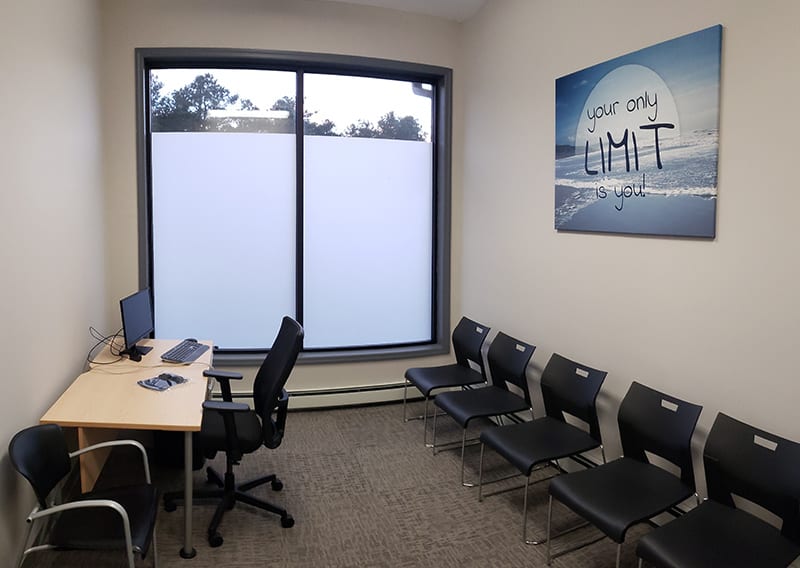Our facility is a warm, inviting, cozy, and secure environment that provides the perfect level of safety, comfort, and privacy as you receive treatment and get on your path to wellness. We’ve designed our space to allow for a low-stress environment where you can focus on your well-being.
Given the concerns of the COVID pandemic, we’re ensuring procedures are followed to create a clean environment for our patients, staff, and visitors. We’ve gone above and beyond CDC and New Jersey State guidance to design our cleaning and disinfecting protocol so that there is no question of the cleanliness and safety of our facility.
You’re here to get well and our priority is maintaining a safe, clean, peaceful, and welcoming environment for you to do just that.
To see our response to Covid-19, click here.
Photo Gallery
Click photos to enlarge
Are You Ready to Begin Your Journey to Recovery?
You could be completely covered. Verify Your Insurance Today.
The Quantum
Process Outpatient Rehab NJ
1. Make the Call
Contact our Quantum Team at
(609) 993 – 0733 to get started.
2. Complete
Your Intake
This streamlined process includes a series of questions and discussion of your unique needs and goals.
3. Get the Best Care Team Possible
After your intake, you’ll meet your Care Team, a group of amazing professionals dedicated to helping you make recovery reality.
4. On-Going Support
After you meet your Care Team, you’ll start to receive treatment based on a Care Plan that’s designed to help you achieve and sustain your recovery.
Drug Addiction and Treatment
There is still a negative stigma associated with drug abuse and drug use disorder. However, substance use disorder is a chronic illness and is not a choice. Understanding drug addiction as a disorder that requires behavioral therapy in treatment centers may take away some of the negative connotations associated with substance abuse. Knowing the warning signs associated with addiction is a valuable tool that may end up helping you or others get addiction treatment early on. Treatment for drug abuse can help anyone achieve successful addiction recovery and long-term sobriety. Personalized treatment plans are key for addiction recovery, as no two addiction cases are the same. Recovery centers offer various levels of care and treatment options to help any stage of addiction or circumstance.
The Definition of Addiction
Addiction is a chronic, relapsing brain disease, similar to a mental disorder, that involves compulsive substance abuse despite negative outcomes on various aspects of the drug abuser’s life. Addiction involves complex interactions between a person’s genetics, brain circuits, life experiences, and environment. Often, substance use disorder can increase risk factors for mental illness. Those with addiction to drugs cannot control their use, even after it interferes negatively in various areas of their lives. Addiction to drugs is said to be a disease of spirit, body, and mind.
Signs and Symptoms of Addiction to Drugs
Drug abuse and dependence can affect a person physically, behaviorally, and mentally. Drug dependence can often lead to addiction, and signs of drug abuse will be evident in all aspect of their life. Knowing signs of drug addiction and abuse could better your chances of getting addiction recovery early on. Not all addiction looks the same and sometimes the signs of drug and alcohol addiction can be subtle. Some signs of substance abuse and addiction include:
- Changes in sleep patterns
- Stealing to obtain drugs or alcohol
- Extreme or sudden weight loss
- Neglect in appearance or hygiene
- Reduced work or school performance, including tardiness and absenteeism
- Changes in skin complexion
- Spending excessive amounts of money on substance abuse
- Mood swings and irritability
- Dilated pupils or bloodshot eyes
- Anxiety or depression
- Risk taking behavior, such as driving under the influence
Drug Addiction Withdrawal Symptoms
Often with drug abuse and dependence, there is a high probability a person will experience withdrawal symptoms when attempting to stop using. When drug abuse leads to chemical dependency, the body relies on the effects of drugs or alcohol on neurotransmitters in the brain in order to function properly. When those substances are taken away, the person can develop withdrawal symptoms. Alcohol and drug withdrawals are not only painful and very uncomfortable, at times they can turn into a medical emergency. Withdrawal symptoms depend on the type of drug, however some general symptoms of drug withdrawals include:
- Nausea and vomiting
- Heavy sweating
- Anxiety
- Fatigue
- Nervousness
- Headaches
- Bone and muscle aches and pains
- Severe symptoms of drug withdrawals happen with certain types of drugs, including
- benzodiazepine abuse and alcohol abuse, which include:
- Seizures
- Hallucinations
- Delirium
- Paranoia
How Drug Addiction Affects the Brain
Alcohol and drug addiction causes brain changes that cause it to no longer be able to function on its own. Every type of drug affects the brain and neurotransmitters differently, but generally substances with a high abuse potential act on the reward center of the brain. Alcohol and drugs release bursts of endorphins that cause euphoria and an overall good feeling. Over time, the brain learns to associate rewards with substance use and wants to repeat the experience. As substance abuse continues, the brain develops a dependency to drugs or alcohol and can no longer regulate these neurotransmitters without substance use. The person experiences withdrawals and strong cravings when they attempt to stop using and easily relapse to offset those symptoms.
Drug Addiction Treatment
Addiction to drugs and alcohol is difficult to break on your own, however, with the right substance abuse treatment, addiction recovery is possible for anyone. An addiction center can offer personalized treatment plans to fit any person’s needs and unique situation. When substance abuse is present with underlying mental health disorders, such as anxiety, depression, bipolar disorder, or an eating disorder, it is important to find an addiction center with dual diagnosis programming. Alcohol and drug addiction centers can help with both prescription drugs and illicit drug abuse.
If you or your loved ones would like more information about treatment for drug addiction or prescription drug abuse treatment, Quantum Behavioral Health Services is available to answer any questions you may have.








